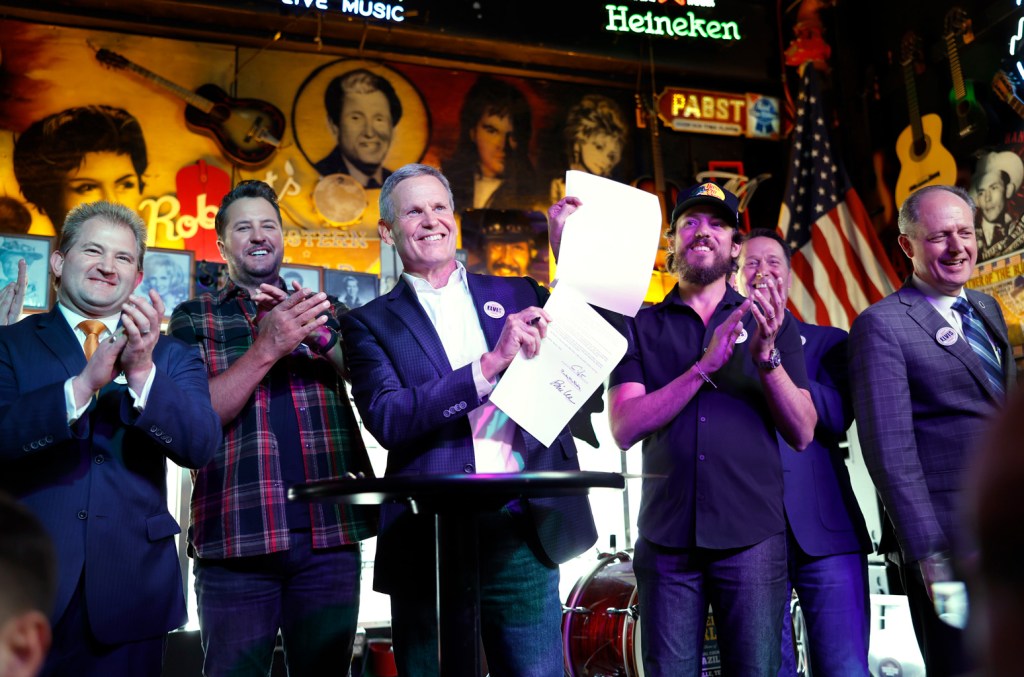A new law in Tennessee aimed at protecting artists from voice impersonation by artificial intelligence has won widespread acclaim from the music industry, but some legal experts worry that such laws could be an “overreaction” that could have unintended consequences .
Less than a year after a fake Drake song created using new artificial intelligence tools took the music world by storm, Tennessee lawmakers enacted a first-in-the-nation law last month aimed at preventing just that scenario — the use of a person's voice without permission. The ELVIS (Ensuring Likeness Voice and Image Security) Act does this by expanding the state's protections against the unauthorized use of a person's likeness, known as rights of publicity.
The passage of the new law was welcomed throughout the music industry. Mitch Glazier of the Recording Industry Association of America called it an “incredible result”. The Recording Academy's Harvey Mason Jr. described it as a “groundbreaking achievement”. David Israelite of the National Association of Music Publishers called it “a major step forward”. Any music artist who has had their voice used without permission probably shares these sentiments.
But legal experts are more divided. Jennifer Rothman, a law professor at the University of Pennsylvania and one of the nation's leading experts on publicity rights, sounded the alarm last week at a debate in Nashville, warning that Tennessee's new statute was unnecessary and had been “convinced ” law.
“We don't want a momentary overreaction to lead to laws being passed that would make things worse, which is happening right now,” Rothman told her colleagues and the audience. “The ELVIS Act has a number of significant concerns raised, particularly with its broad coverage of liability and restrictions on speech.”
In an effort to combat artificial intelligence voice cloning, the ELVIS Act makes some key changes to the law. More directly, it extends existing state publicity rights protections to expressly include one's voice as part of one's likeness. But the new law also expands the law in ways that have received less attention, including adding a broader definition of who can be sued and for what.
According to Joseph Fishman, a law professor at Vanderbilt University who follows the legislation closely, this broader wording “wipes out innocuous behavior that no one seriously believes is a problem that needs solving” — potentially including tribute bands, interference or even just sharing a photo that a celebrity didn't authorize.
“The range of acts that give rise to liability is huge,” says Fishman Advertising sign. “All the press around this law is focused on deepfakes and digital copies – and those would indeed be covered – but the law as written goes much further.”
Here's why: Historically, publicity rights in the US have mostly been limited to commercial contexts — such as advertisements that use a celebrity's likeness to appear to be endorsing a product. Singer Bette Midler once sued Ford Motor Co. for a series of commercials that featured vocals by a Midler impersonator.
The new law effectively gets rid of this trade restriction. Under the ELVIS Act, anyone who knowingly “appropriates” someone's likeness without authorization can face a lawsuit. It also broadly defines protected voices as any sound that is “readily identifiable and attributable to a specific individual.”
These are great changes if you're a music artist trying to sue over a song that uses a fake version of your voice, as the old concept of publicity rights probably wouldn't apply in that scenario. But Fishman says they have serious potential for collateral damage beyond the intended target.
“There's nothing that limits it to AI outputs, nothing that limits it to deceptive uses,” Fishman said. “The lead singer in an Elvis tribute band who sings convincingly like The King certainly seems to fit the definition. So do Elvis impersonators.”
In an “even more extreme” hypothetical, Fishman imagined an “unflattering” photo of Elvis that he knew the Presley estate didn't like. “The law seems to say I would be liable if I sent this photo to a friend. Besides, I am broadcasting its likeness, knowing that the rights holder has not authorized the use. Stop and think about it for a moment.”
The ELVIS Act contains exceptions aimed at protecting free speech, including those that allow the lawful use of one's likeness in news, criticism, scholarship, parody, and other “fair use” contexts. It also expressly allows “audiovisual works” that contain “a representation of the person as the person himself” — a provision likely aimed at allowing Hollywood to continue making biopics and other movies about real people without being sued in Tennessee .
But confusingly, the law says these exceptions apply only “to the extent that such use is protected by the First Amendment.” That wording, according to Rothman, means that these exceptions essentially “do not exist” unless and until a court decides that a particular alleged activity is a form of protected free speech, a costly extra step that will primarily benefit those want to participate court. “This particular law creates great work for lawyers,” Rothman said. “So much work for lawyers.”
These lawyers are going to file real lawsuits against real people—some of whom are the terrifyingly evil voice-cloning actors the music industry wants to crack down on, and some of whom are probably just regular people doing things that used to be lawfulness.
“The law could definitely lead to a lot of lawsuits,” says Fishman. “There's plenty of room here for people to test how far the statute can go, either because they object to the way they're being portrayed or because they see an opportunity for an additional flow of permits.”
Although only applicable to Tennessee, the importance of the ELVIS Act is magnified because it is the first of potentially many such legislative efforts aimed at addressing artificial intelligence imitation. At least five other states are currently considering amending their rights-of-publicity laws to address the growing problem, and lawmakers on Capitol Hill are also considering federal legislation that would create a national uniformity law for the first time.
At last week's roundtable, Rothman said those efforts were misguided. He said laws already on the books — including federal trademark law, existing publicity rights laws and many other statutes and torts — already provide avenues to stop voice cloning and deepfakes. And he warned that proposed federal bills pose even more serious problems, such as allowing someone to sign away their equal rights forever.
For other legal experts critical of the ELVIS Act, including Harvard University law professor Rebecca Tushnet, the hope is that any subsequent legislation, whether at the state or federal level, can be more directly tailored to the actual scams fueled by the ELVIS Act. artificial intelligence that is supposed to address.
“Any new law needs to be much more targeted at specific harms,” says Tushnet, who has written extensively on the intersection of intellectual property and free speech. “Right now, this statute and other proposals are dramatically overbroad and threaten legitimate creative behavior.”



